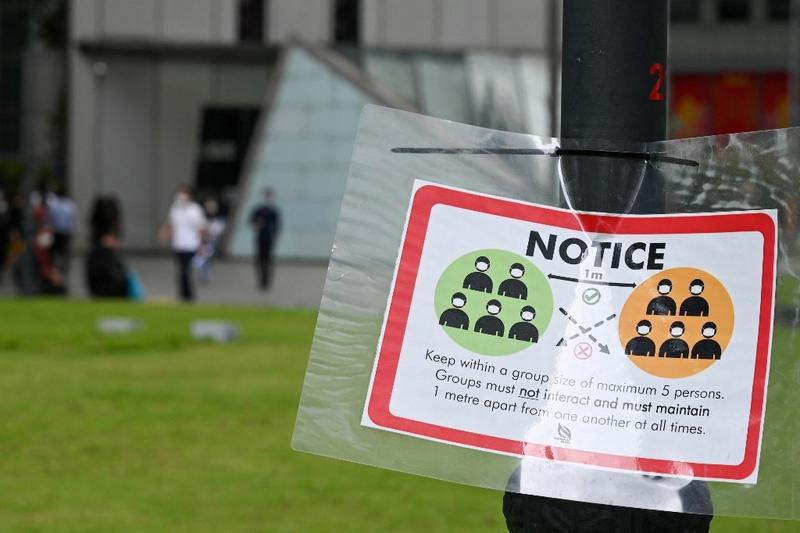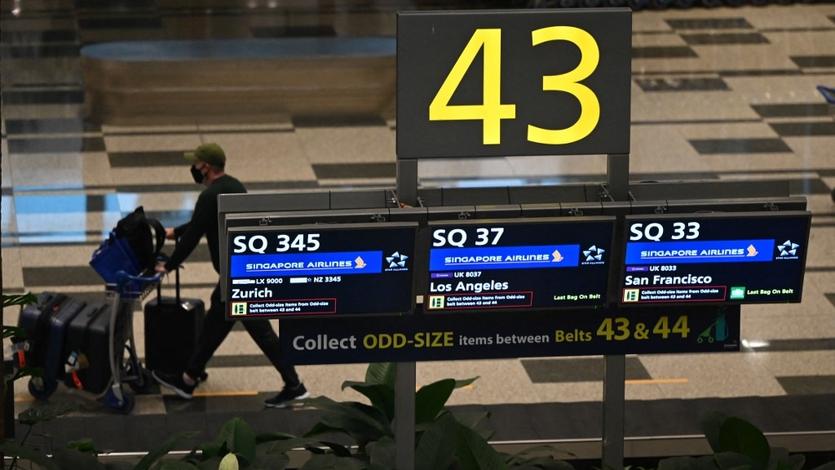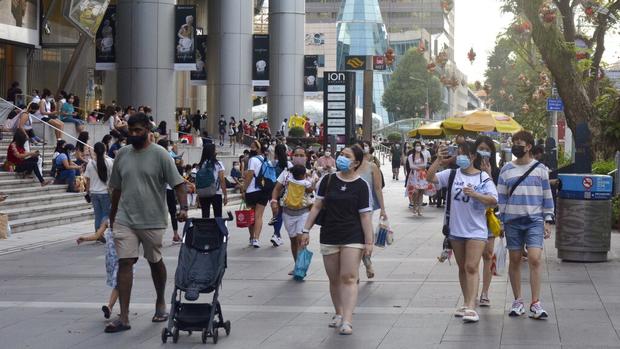 A notice warning people not to gather in groups larger than five persons as part of restrictions to hald the spread of the coronavirus is displayed at Raffles Place financial business district in Singapore on Jan 4, 2022. (ROSLAN RAHMAN / AFP)
A notice warning people not to gather in groups larger than five persons as part of restrictions to hald the spread of the coronavirus is displayed at Raffles Place financial business district in Singapore on Jan 4, 2022. (ROSLAN RAHMAN / AFP)
High vaccination rate and effective pandemic management will help Singapore mitigate the risks of opening the city-state’s borders to more countries, health experts said.
After a brief pause in December due to the spread of the highly-transmissible Omicron variant, Singapore has resumed its plan to allow fully vaccinated travelers to come in without having to undergo quarantine, under the Vaccinated Travel Lane, or VTL, program.
Transport Minister S. Iswaran said on Feb 16 that the VTL will now include Qatar, Saudi Arabia and the United Arab Emirates. These three are in addition to 24 nations that have already been in the program.
While a record 19,420 new COVID-19 cases might seem daunting for a densely populated place like Singapore, infectious disease experts noted that most of the cases are mild and that a highly vaccinated population will ensure that the risk of infection spread will be reduced
Singapore will also increase the daily quota of VTL travelers from 5,000 to 15,000.
Iswaran made the announcement a day after Singapore registered a record 19,420 new COVID-19 cases. While this figure might seem daunting for a densely populated place like Singapore, infectious disease experts noted that most of the cases are mild and that a highly vaccinated population will ensure that the risk of infection spread will be reduced.
“The risk to opening up Singapore for travel is lower now compared to before … (because) we have achieved a very high level of vaccination. The population at large is actually very well protected by vaccines,” said Teo Yik Ying, dean of the Saw Swee Hock School of Public Health at the National University of Singapore, or NUS.
Over 90 percent of Singapore’s 5.4 million people are fully vaccinated, while 66 percent have received their booster shots as of Feb 20, according to the city-state’s Ministry of Health, or MOH.
Teo said that travelers who come in through VTL are not only fully-vaccinated but are “tested fairly rigorously”.
ALSO READ: S'pore to hike taxes on rich as it winds down virus spending
 A passenger on Singapore Airlines flight arrives, under the Vaccinated Travel Lane (VTL), at Changi Airport in Singapore on Oct 19, 2021. (ROSLAN RAHMAN / AFP)
A passenger on Singapore Airlines flight arrives, under the Vaccinated Travel Lane (VTL), at Changi Airport in Singapore on Oct 19, 2021. (ROSLAN RAHMAN / AFP)
Under the VTL scheme, travelers will need to take a supervised antigen rapid test within 24 hours of their arrival. This measure started on Feb 22 and replaced the previous practice of conducting an on-arrival polymerase chain reaction (PCR) test at the Changi Airport.
The actual number of those who are severely ill in ICU requiring intubation so far has mercifully remained low despite the tens of thousands of new cases identified every day.
Paul Anantharajah Tambyah, president of the Asia Pacific Society of Clinical Microbiology and Infection
Paul Anantharajah Tambyah, president of the Asia Pacific Society of Clinical Microbiology and Infection, said the “overwhelming majority” of the new cases in Singapore are locally transmitted, and that imported cases made up only a small proportion over the last few weeks.
For example, the MOH reported that Singapore posted 13,623 new cases on Feb 21. But only 147 of those cases were imported, while the rest were locally transmitted ones.
Tambyah feels that Singapore is in a position to expand its VTL and move on with the living-with-COVID policy.
“While there are some stresses on the healthcare system, a lot of that is because of an abundance of caution which guides the management protocols. The actual number of those who are severely ill in ICU requiring intubation so far has mercifully remained low despite the tens of thousands of new cases identified every day,” he said.
ALSO READ: Singapore's 2021 GDP grows at fastest pace in over a decade
The MOH said that as of Feb 21, a total of 1,606 COVID patients were in hospitals, with 44 of those patients in the ICU.
“Thankfully, with (Singapore’s) high vaccination rates, we have been able to prevent the healthcare system from being overwhelmed,” said Hsu Li Yang, vice dean of global health at the Saw Swee Hock School of Public Health in NUS.
Hsu expects the “Omicron wave” in Singapore to “reach a peak and decline, just as it has done so in other countries”.
 People wearing protective face masks walk along the Orchard Road shopping area in Singapore on Nov 28, 2021. (ANNABELLE LIANG / AP)
People wearing protective face masks walk along the Orchard Road shopping area in Singapore on Nov 28, 2021. (ANNABELLE LIANG / AP)
It will be too costly from a socioeconomic perspective to try to eliminate COVID-19 from Singapore, now that it is so firmly entrenched in most of the world.
Hsu Li Yang, vice dean of global health at the Saw Swee Hock School of Public Health in the National University of Singapore
Singapore cannot afford to close its borders for a long time, he said, adding that “it will be too costly from a socioeconomic perspective to try to eliminate COVID-19 from Singapore, now that it is so firmly entrenched in most of the world”.
Vijay Verghese, editor of online magazine Smart Travel Asia, said Singapore is treating COVID-19 as “an ongoing reality”.
“The fact is even closed borders have limited efficacy against a virus. Omicron's stealth and high transmission rate adds to the problem. But countries are gambling that vaccinations and boosters combined with the antibodies in recovering populations will offer sufficient minimum protection for life — including travel — to return to some semblance of normalcy,” he said.
Teo, from NUS, said Singapore is still “on the journey” towards living with COVID-19.
READ MORE: Singapore to freeze new ticket sales for quarantine-free arrivals
“We haven’t reached endpoint yet. The endpoint will be when we are able to lift many of these measures that we have in place… (so that) regardless of where you're flying from, as long as you're fully vaccinated, you can come into Singapore without quarantine,” he said.


